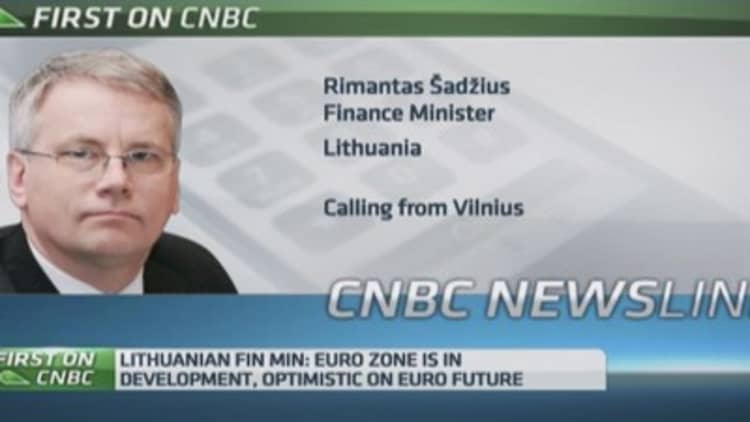
Lithuania joined the euro zone on Thursday, despite long-lasting fears about the currency union's economic health, and reignited worries about Greece exiting the group.
The Baltic nation, which has a population of just 3 million, got the green light to adopt the euro in July 2014, and officially joined the euro zone on January 1.
To qualify, Lithuania had to meet five economic "convergence criteria," including price and exchange rate stability and low levels of government debt and deficit. Its people will exchange their Lithuanian litas at a rate of 3.4528 to the euro.
Lithuania is following in the footsteps of other former Eastern bloc countries which joined the European Union (EU) in 2004 and went on to enter the euro zone. These include Estonia and Slovakia, and most lately, neighboring Latvia.
Lithuania's ascension comes at a worrying time for the currency union, which has struggled to recover from the regional debt crisis that peaked in 2010.
Nonetheless, euro zone membership marks an apex for many countries striving to integrate with the West—the significance of which has been highlighted by the upturn in tension between Russia and the European Union and U.S. following the Kremlin's incursions in Ukraine last year.
Read MoreUkraine: Is it time to buy?
"The euro zone is in its development, this is the main reason which makes me very optimistic about the future of euro as a single currency," Lithuania's finance minister, Rimantas Šadžius, told CNBC on Friday.
He said that operating the single currency union was "very complicated," but "quite efficient".

A fledgling euro zone recovery at the end of 2013 failed to take flight and euro zone economic growth is seen averaging a weak 0.8 percent for 2014. Meanwhile, inflation is well below the 2 percent level targeted by the European Central Bank and unemployment remains very high in several countries.
Read MoreEuro zonemanufacturing 'near-stagnant' at year-end
More recently, fears that a country could look to quit the euro zone re-emerged as Greece announced snap general elections for January. Syriza, the far-left opposition party, is seen in the lead, and has vowed to overthrow the onerous terms of Greece's international bailout, potentially destabilizing the country's relationship with the rest of Europe.
The enthusiasm of ordinary Lithuanians for euro membership has risen in recent months. According to an official Eurobarometer opinion poll, 63 percent of Lithuanians had a "positive stance" on the euro last month, up by 13 percentage points since June. In addition, nearly three-quarters (73 percent) of Lithuanians said they were "optimistic" about the future of the euro zone.
On Friday, Šadžius told CNBC that Lithuanians's enthusiasm for joining the euro was largely for economic reasons rather than because of fears over Russia's sway in Eastern Europe.
"I think the main argument for the people is economic," he said. "I think that with time when we use this currency, when we make it to work in favor of Lithuania... support for the euro will grow," Šadžius said.
The country is likely to be the last new member of the union for a while, however. Romania is the only EU country with a target date to start using the euro—and that is four years away in 2019.
Established EU members Denmark and the United Kingdom have opted out of using the euro, and newer members Bulgaria, Croatia, Czech Republic, Hungary and Poland do not currently have target dates to start using the currency.




